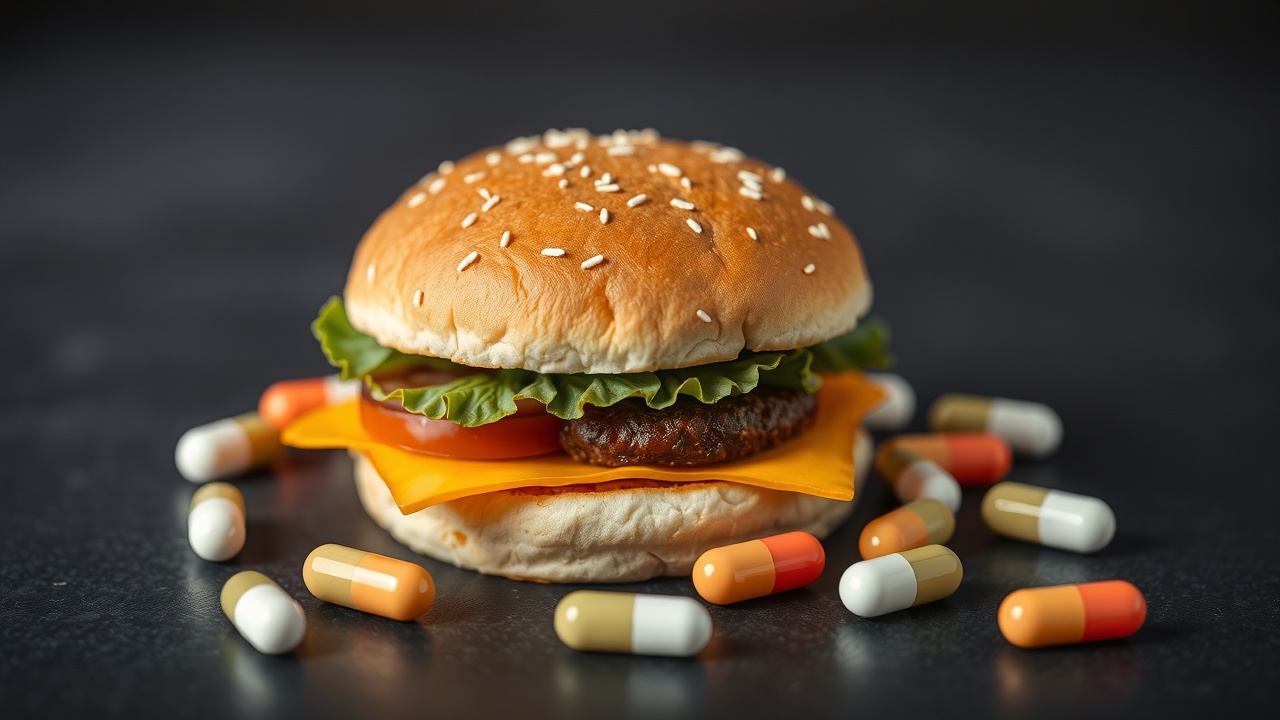
According to James Mackreides, while the new generation of weight-loss medications are helpful for overweight people, they also hold the potential to transform the economy and alter our relationship with food
The issue of obesity is becoming more widespread worldwide and poses a serious risk to people's health. "Being overweight and healthy is really difficult," says Ali Khavandi, a consultant interventional cardiologist at the Royal United Hospital Bath, adding that it is not only a cosmetic problem but also a major health issue.
More than 40% of adults in the US are considered obese, which has led to a "health crisis" due to increased healthcare expenses and decreased worker productivity.
For governments, obesity is a "pressing issue" because it even affects military recruitment, according to John Plassard, senior investment specialist at Mirabaud Group.
Nevertheless, there is good news. Governments are working to promote a healthy diet. Additionally, the newest class of weight-loss medications appears to be very successful. According to Plassard, these medications promise to reduce our waist sizes and drastically change the way we feel about food. The food industry will be significantly impacted by that.
Weight-loss medications are revolutionary.
The major innovation has been the creation of so-called GLP-1 receptor antagonists, like semaglutide, which Novo Nordisk markets under the Ozempic and Wegovy brand names (similar medications are marketed by other companies, like Eli Lilly). Originally created to treat diabetes, these medications have been remarketed as weight-loss aids because they work by imitating the gut hormones that cause feelings of fullness, which lowers appetite and caloric intake. Roel Houwer, a product manager at asset manager VanEck, says that patrons are already choosing to order smaller portions due to the widespread use and impact of these drugs.
Khavandi concurs that the drugs are a game changer. Our knowledge of their long-term efficacy and adverse effects is still limited because they have only recently entered the market. However, their popularity is undeniable. The drugs are being purchased privately from internet pharmacies, which are "struggling to keep up with the demand," by patients who are not eligible for NHS treatment. Some people use the drugs for a brief time before quitting, usually due to stomach issues or because they find the idea of becoming dependent on an injectable drug repulsive.
However, the majority of people use the drugs consistently, in part because they create a positive feedback loop in which "you lose weight, so you feel lighter and maybe have less knee or joint pain, which in turn gives you more energy, so you lose even more weight." As new drug formulations with fewer or more controllable side effects are created and health systems expand the number of people who can receive treatment, their use is only expected to increase.
Does junk food have an end?
Curiously, Carl Hazeley, chief analyst at fintech company Finimize, claims that the new medications improve the quality of the food people choose to eat in addition to causing them to eat less. According to a study conducted by Walmart, one of the biggest retailers in the US, smaller food baskets and healthier, lower-calorie food options were seen going through the tills in stores with pharmacies where customers could pick up prescriptions for medications used to lose weight. Therefore, it appears that those using weight-loss medications start eating healthier foods instead of junk food.
The industry is under increasing regulatory pressure to improve food quality, which should further push this shift. To "crack down on junk food in general," for instance, the government of the United Kingdom has pushed businesses to lower the amount of salt and sugar in their goods. For instance, shops in the UK are prohibited from displaying candy close to the register, a regulation that went into effect in 2022, and advertisements that promote junk food are also restricted. Although the US is lagging behind other countries in this regard, "the push provided by the weight-loss drugs will hopefully prompt food producers to move away from empty calories."
According to Martin Frandsen, a portfolio manager at Principal Global Investors, additional research on consumer purchasing trends supports the idea that weight-loss medications are having an effect on sales. One found that most people's overall grocery spending is decreased by weight-loss medications, but that the effect is most noticeable for low-income households. The amount spent on "chips, savoury snacks, sweet bakeries, soft drinks, and frozen food" is "significantly reduced" for this group, who "end up spending 8 percent-9 percent less on groceries."
Opportunities for healthier food.
It sounds like bad news for companies that make junk food. However, it could be advantageous for other food producers. According to the same studies, people using weight-loss medications "actually end up spending more money on fresh produce and yoghurts," according to Frandsen. The increase in fresh produce consumption may make sense, but why yoghurt? It could be that the medications, as mentioned earlier, are harming the stomach and making people feel queasy, so they are choosing to eat calming foods.
The medications have also been shown to increase sales of foods high in protein, according to Jeneiv Shah, portfolio manager for the Sarasin Food and Agriculture Opportunities Fund. This is because people who use the drugs frequently lose both muscle and fat, and eating foods high in protein and exercising frequently helps to rebuild the lost muscle. Protein shakes and other "ready to drink" products, as well as protein-enriched foods like yoghurts, will therefore see a significant increase in demand.
According to Frandsen, all of these trends will have an effect further up the food industry's supply chain. For instance, since fresh food has a much shorter shelf life, you will also need to have better inventory control systems if people are purchasing more fresh produce. For businesses developing such systems, that might be a fantastic opportunity. Similarly, the increase in consumption "will be good news for some of the leading ingredient players in the market" because yogurts frequently contain additional ingredients like vitamins and probiotics.
You want dampeners.
According to Dasha Fomina, an equity research analyst at William Blair Investment Management, the new generation of weight-loss medications primarily aim to reduce appetite, but there is also evidence that they may "make a profound impact on broader lifestyle choices in other areas, for example, by influencing alcohol and tobacco consumption." Research "indicates a specific decline in the craving for sweet alcoholic drinks," she claims. Additionally, Hazley cites early research suggesting they might act as a deterrent to bad habits.
According to Aarin Chiekrie, an equity analyst at Hargreaves Lansdown, this development occurs against the backdrop of "a slow-burning downward trend" in youth drinking that "started 20 years ago." Young people today are less likely than they were in previous decades to drink alcohol, and when they do, they do so later in life, less frequently, and in smaller quantities. This is demonstrated by the fact that pubs are struggling in addition to consumption surveys. Ten years later, the UK had 46,800 pubs, down from 55,400 in 2010.
According to Chiekrie, it's not all bad news for the beverage companies. Overall, consumers are making fewer purchases of alcohol, but many are adopting a "buy less, buy better" strategy, and many businesses are "pivoting their offerings to cater to this." For instance, premium and craft drink brands "remain strong," and demand for alcohol-free beers is rising because they "are becoming more socially acceptable to drink at events, more available at bars, and (crucially) much tastier to drink" than the previously offered options. Diageo, for instance, made significant investments in Guinness 0.0, its stout without alcohol. In 2024, its sales in Europe doubled, and it topped the list of non-alcoholic beers in UK-licensed establishments.
Similar patterns are evident in both Europe and the US, according to Houwer. For instance, according to a study conducted by the European Commission's Directorate-General for Agriculture and Rural Development, the market for low- and nonalcoholic beveragesof which almost all are nonalcoholicis expected to reach 7.5 billion euros in the EU alone by 2021. Germany was the top producer of non-alcoholic beer, making up almost one-third of the EU's total production in 2019.
The revolution of veganism.
In addition to consuming less alcohol, younger consumers are also avoiding dairy and animal products, either for moral reasons (e.g., animal welfare or environmental concerns) or due to the purported health advantages of a vegetarian diet. The health advantages of such a move, according to many, have been overstated. Khavandi explains that the reason meat has always been a part of most diets worldwide is because the animal has already done the majority of the work of obtaining the nutrients from vegetable matter for you when you eat meat. In contrast, a diet that is solely plant-based is frequently inadequate in nutrients, which is "why most vegans end up having to supplement their diet artificially." As Hazeley states, "you end up replacing a moral problem with a physical one" because meat substitutes sometimes contain a lot of artificial flavorings.
It is difficult to deny, however, that consumers' interest in animal protein substitutes has grown significantly, as evidenced by the variety of products at their disposal. "A few years ago, soy was the only viable substitute for cow's milk," says Frandsen. However, "things have developed so quickly that there are around ten different types of alternative milk, and if you go into any large coffee chain you can easily find other alternatives, such as almond, oat, or coconut milk." In fact, about 15% of the "milk" that is currently sold in the US is plant-based.
"The plant-based meat substitute market is a little more complicated," says Frandsen. While some consumers prefer their meat substitutes to taste like meat, others do not. Rather than investing in businesses that sell the finished product, he suggests investing in businesses that specialize in adding ingredients to food because this diversity "has made it harder for producers to achieve enough scale to reduce costs." However, this market is also expanding quickly. "Alternative protein technologies such as precision fermentation (using genetically modified yeast and bacteria to grow specific ingredients) and cultivated (laboratory-grown) meat are poised to drive the next phase of innovation in the sector," says Lale Akoner, a strategist at eToro, although the initial excitement surrounding products like Beyond Meat and Impossible Foods has subsided.
Akoner claims that the food and drink industry is undergoing a "fundamental transformation" as a result of a number of factors, including the emergence of new weight-loss medications, health-conscious consumers, changes in regulations, and advancements in food technology. Those who are resistant to change run the risk of becoming obsolete, but those who recognize these trends and take appropriate action will "thrive" in the "fierce" competition for market share. Below, we examine some of the top choices available to buyers.
The best investments available right now.
The majority of funds allocated to anti-obesity medications make investments in the medications themselves. An exchange-traded fund (ETF), like the VanEck Sustainable Future of Food UCITS ETF A USD Acc (LSE: VEGI), is a way to profit more widely from shifts in consumer preferences. "Relatively diversified access to companies at the forefront of sustainable and innovative food solutions" is what Houwer says the fund's tracking of the MVIS Global Future of Food ESG index is intended to provide. The third-largest holding, Danone (Paris: BN), is one of the major holdings. As previously mentioned by Hazeley, the propensity of anti-obesity medications to cause gastrointestinal distress in certain users is driving up demand for Danones yoghurts. The company is trading at a yield of 3.14 percent and 17.5 times 2026 earnings. An annual charge of 0.45% is imposed on the VanEck fund.
The Sarasin Food and Agriculture Opportunities P Acc is a current fund that is worth taking into account. It is run by Jeneiv Shah and Colm Harney, and it makes investments in businesses globally that stand to gain from the expansion of the food and agriculture industries. Many of its investments, including BellRing brands (NYSE: BRBR), the fund's second-largest holding, will benefit from the growth of anti-obesity medications. It produces a well-liked protein shake that can counteract the muscle loss caused by anti-obesity medications, it has seen a more than twofold increase in sales between 2019 and 2024, and it is distributed by major US supermarkets and wholesalers, including Costco (the fund's largest holding). At 25.6% of 2026 earnings, BellRing is currently trading at a 25.6% annual charge for the entire fund.
Another business owned by the Sarasins fund (along with the VanEcks ETF) and that stands to gain significantly from the popularity of anti-obesity medications is Kerry Group (LSE: KYGA), which sells specialty ingredients that enhance the flavor and nutritional value of branded goods. According to Shah, the necessity to restructure and rework food items to complement anti-obesity medications is anticipated to increase demand for Kerry's services, which will provide significant "tailwinds" for the business. Normalized earnings per share for Kerry have increased by almost a third since 2020 and are predicted to continue rising. Its stock has a yield of 1.45% and is trading at a comparatively low 17.3 times 2026 earnings.
Plassard adds that concentrating on food manufacturers who are "positioning themselves well in the evolving health-conscious market" is another tactic. General Mills (NYSE: GIS), which is "aggressively expanding into organic, high-protein, and functional nutrition" in response to consumer preferences for cleaner ingredients and lower-calorie options, is one company he prefers. With a double-digit return on capital employed, General Mills has demonstrated a strong track record of increasing sales by approximately 34% annually and increasing profits by over 50% between 2019 and 2024. Its shares have a dividend yield of 3 percent and are trading at 14 percent of 2026 earnings.
A few drink companies should still do well even though anti-obesity medications and a broader millennial trend away from alcohol consumption may reduce alcohol sales overall. Akoner commends the Boston Beer Company (NYSE: SAM) for "innovating in alcohol-free options" among these examples. It should continue to expand due to its strength in specialty and craft beers, which are also well-liked by younger consumers. Between 2019 and 2024, Boston Beer Company's sales increased by 61%, more than making up for the share price of 20 points three times 2026 earnings.














Leave a comment on: Drugs for weight loss have the potential to transform the economy; now is the time to invest in them